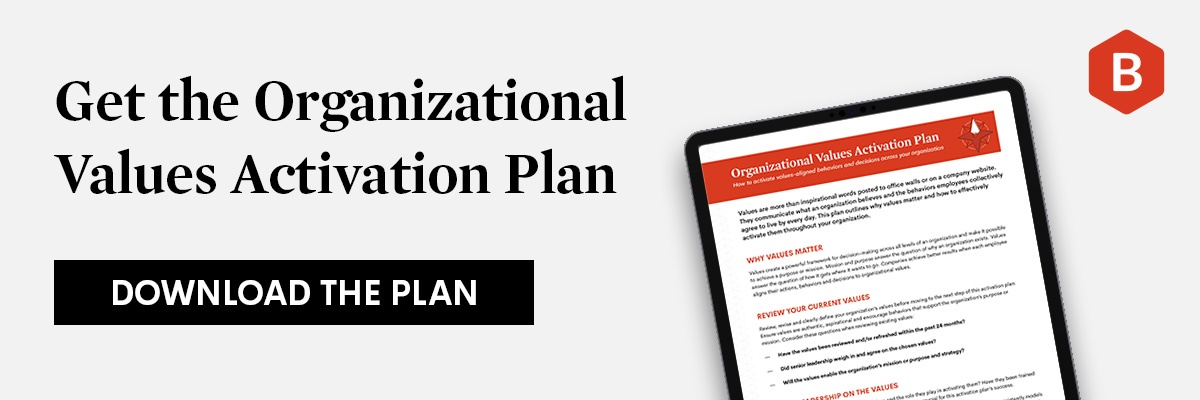Blog
4 Ways Organizational Values Can Fuel Decision-Making
|

Blog
4 Ways Organizational Values Can Fuel Decision-Making
|

Organizational values create a powerful framework for decision-making. Values, which can also be known as guiding principles, company principles or company beliefs, are what an organization believes and the behaviors it agrees to live by every day. Values guide employees on how to do their job and interact with customers, colleagues, partners and the broader community.
Organizational values also help make it possible for organizations to activate their purpose or mission on a daily basis. Not every employee participates in executive-level strategic decisions, but each has a role to play in living the organization’s values. Companies can make progress toward their goals and outcomes when employees collectively align their behavior and decisions to organizational values.
Activate your values. Get the Organizational Values Activation Plan here. →
Below are four key ways organizational values can fuel decision-making across companies:
1. Informing key business strategies
Organizational values provide a lens through which to make significant business decisions. They can influence everything from finance and operations to human resources, marketing and sales. Some questions businesses should answer with organizational values in mind, include:
- Who do we bank with and use to manage our investments?
- Are we sourcing from local and diverse vendors?
- Are our talent decisions in line with our values, including our diversity, equity and inclusion (DEI) efforts?
- Who are our target customers?
- What types of products and services do we offer?
CVS Health is an example of a company that uses its leadership values to inform business strategy. The company’s purpose statement is: “Helping people on their path to better health.” Its guiding principles are innovation, collaboration, caring, integrity and accountability. CVS stopped selling all tobacco products in its stores in October 2014. When announcing the decision, CVS said it was “the right thing to do for the good of our customers and our company” and “the sale of tobacco products is inconsistent with our purpose.” It could not, in good conscience, believe it was acting with integrity and care when promoting a product so detrimental to its customers’ health. CVS held itself accountable for authentically working toward its purpose by behaving according to its values.
Another example is Athleta, a Certified B Corp and women’s activewear clothing brand. One of Athleta’s values is sustainability sustains us. It demonstrates this organizational value by choosing suppliers and business practices that align with it. Sixty percent of Athleta’s materials, for example, use sustainable fibers, and it diverts 70 percent of its waste from landfills.
2. Hiring, incentivizing and promoting the right talent
Companies can manage and engage the right talent by using organizational values to guide decisions related to hiring and incentivizing and promoting employees. Companies that are clear about their company core values can more easily attract candidates whose personal values align with the organization’s values. This harmony in values attracts more passionate, committed and productive employees.
Click here to learn more about the business impacts of purpose or mission. →
Companies can incorporate values into recruiting efforts by developing values-based behavioral interview questions that help identify which candidates will be most likely to successfully embody organizational values. Hiring talent that understands and embraces its values means companies have employees that can collectively work together to achieve the organization’s purpose or mission.
Reviewing, recognizing and incentivizing employees based on how well they demonstrate and live the organization’s values also helps the company reinforce them. Companies can incorporate the values into performance reviews to celebrate, coach or correct behavior. This reinforcement serves as a continual reminder about how seriously the company takes its values and ensures that employees continue to embrace and activate them.
3. Selecting vendors and partners
Values also inform decisions on which vendors, partners and suppliers a company should work with. Choosing vendors based on values has far-reaching effects when integrated throughout the business. It affects decisions made about things like where the company buys its paper, coffee and cleaning supplies and what vendors it works with.
Beehive, for example, recently began serving Well Rooted Teas, a local tea company that sources its ingredients from regional farms that use sustainable farming practices. These decisions, while they may seem minimal compared to other corporate decisions, absolutely play a significant role in how fully and deeply the organization embraces its values.  4. Developing a corporate impact strategy
4. Developing a corporate impact strategy
Organizational values also help guide decisions around corporate giving, corporate social responsibility or other corporate give-back strategies. An organization’s value set can inform whether a company has a corporate impact strategy, what it is, who participates and how they bring it to life. Companies often choose to activate values related to helping others or giving back through corporate giving or employee volunteerism.
In addition to a sustainability value, retailer Athleta also has a value of sisterhood elevates. It brings this value to life by empowering women through investments in Gap’s Personal Advancement & Career Enhancement (P.A.C.E.) program. P.A.C.E. helps women advance in the workplace and their personal lives through foundational life skills, technical training and support. Athleta brings its woman-empowerment value to life through a program that focuses specifically on impacting the lives of women.
Why authenticity matters
Customers, employees and other key stakeholders expect companies to choose organizational values they can authentically embody. Companies risk being publicly called out by the marketplace and their employees if they tout values that contradict how the business operates.
Everlane, an online clothing store founded on the values of exceptional quality, ethical factories and radical transparency, is a recent example of this. News broke recently that customer support and retail workers were looking to unionize, citing complaints of low pay, a lack of benefits and unpredictable scheduling, which run contrary to the company values. Employees were encouraged not to unionize. Everlane’s employees didn’t feel the company was authentically living its values, which diminished their trust and, ultimately, could erode consumer trust.
Organizational values create an essential and effective framework for companies. They guide decisions across all levels of an organization, ensuring that employees are collectively and authentically working toward achieving its purpose or mission. Learn more about the risks of purpose, mission and values misalignment here.
